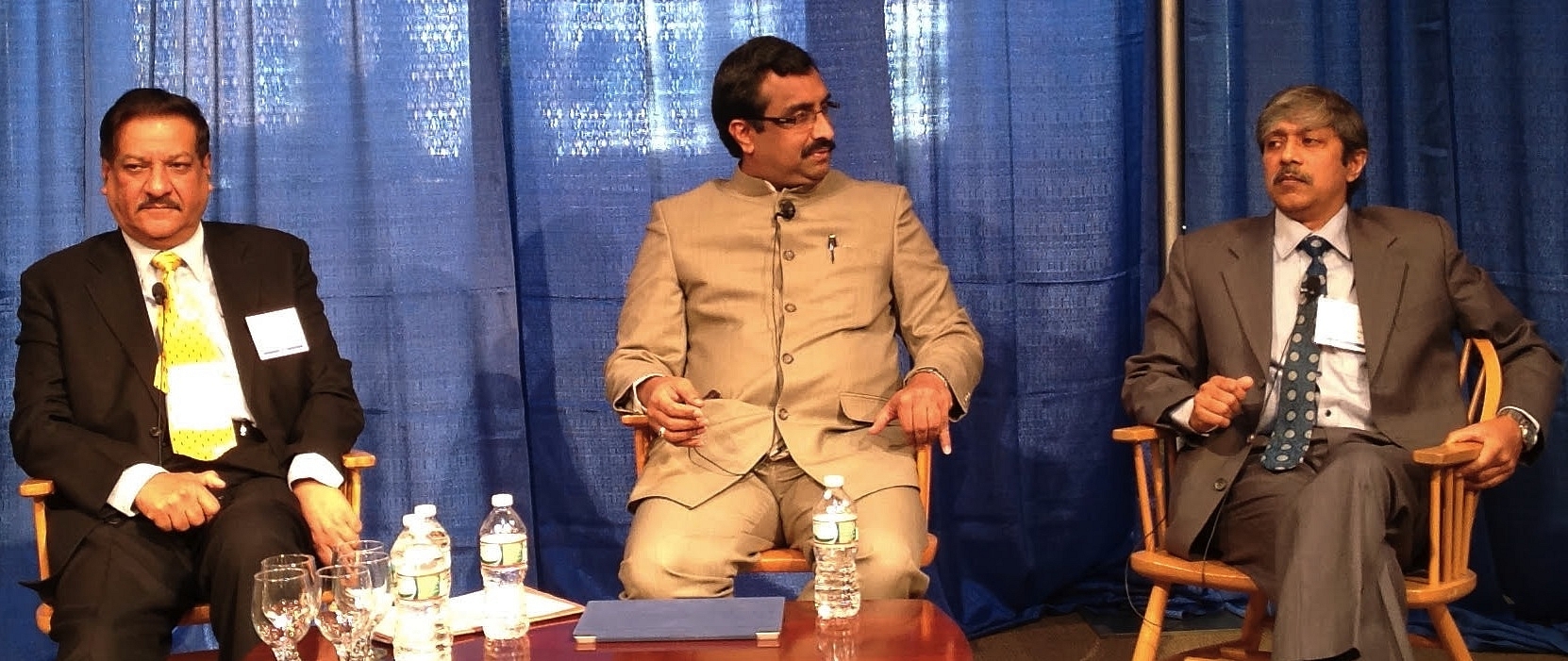India Conference at Harvard
Politics As Public Service Must Return

Report from opening session from ‘India Conference’ at Harvard. The two speakers were Ram Madhav of the BJP and Prithivraj Chavan of the Congress. The session was moderated by Rajiv Deshpande, political editor, Times of India.
Swarajya was represented at the event by Swaminathan Venkataraman
Ram Madhav
Ram Madhav began with a Nehru anecdote. He told that Nehru had once said about that democracy that it was the second-best form of government while the best form was yet to be invented. Madhav said that for him “new politics” meant a better way of running our affairs, which germinated and grew independent of the new media. Madhav said that new politics was needed because the old style of it falls woefully short to meet the needs of out 500 million storng worhforce. And for new politics, he believed, one needs new leaders.
Madhav felt that while before independence politics was a passion, it had become a family business after it. Politics, he felt, requires passion. Ideology, for its part, should be a guiding principle and not a barrier. Idealism, he said, was as important as ideology.
Madhav identified six core thrusts of politics: bijli, Sadak, pani, swachta, swastik and suraksha. According to him, new politics and politicians must operate along the six guidelines above. He felt that Modi is one such politician.
Further he went on to describe the qualities of an ideal king/ruler/governor through examples of the Arthashastra. A king should live the life of the last subject of his country, according to this doctrine. If the subject/citizen sleeps on floor, then the king must sleep on the floor, too. When Chandragupta Maurya refused to marry the daughter of the Greek general Seleucus Nicator, he was advised to keep the country’s interests above his and go ahead with the marriage.
The purpose these fables for Madhav was to drive the point that the idea of politics as public service must be re-introduced. Committed people and institions are needed for that to happen, said Madhav. But he also added, that there was some movement in that direction.
As for new media, he argued that it had become a positive restraining factor. With its emergence, politicians are being held accountable to their words. Also, he said that new media had democratized opinion which was earlier a monopoly of few individuals.
Prithviraj Chavan
Chavan started by saying that India was at a very interesting point in its history. After a full 30 years a party enjoys majority in the Lok Sabha, and a leader enjoys total command over his party. India should utilize the opportunity to grow at close to 10%. He felt that if we were unable to do so, we would have failed future generations.
He felt that new media has massive impact on elections in present times. He said he faced two elections last year and his party was drubbed in both. He was of the view that the electorate now does not look at the a longer time frame. It is only the recent past which matters for them, he said. The electorate today, he said, was impatient. When a government does good work, said Chavan, the demands of the electorate only increase. Whereas, a failure stays with the government forever. New politicians, he felt, must be trained in sound-byte politics.
He said that in the arena of new politics, the role of the party was under stress. According to him, elections are now being fought more on within constituencies than between parties.
He also felt that in the current age, direct communication of a leader with the electorate has become very important, something he said, Narendra Modi did very well during Lok Sabha election campaign. Lakhs of people came for his public meetings. This, Chavan felt, was proof of the fact that big media houses have lost their ability to influence elections.
To maintain their relevance, political parties would have to be more democratic, said Chavan.
He concluded by saying that it is now being wondered across political parties if India is moving towards an era of stable governments and fewer parties. If that were to happen, said Chavan, it would be in the interests of the country since there would be greater clarity in terms of socio-economic views of each party.
Introducing ElectionsHQ + 50 Ground Reports Project
The 2024 elections might seem easy to guess, but there are some important questions that shouldn't be missed.
Do freebies still sway voters? Do people prioritise infrastructure when voting? How will Punjab vote?
The answers to these questions provide great insights into where we, as a country, are headed in the years to come.
Swarajya is starting a project with an aim to do 50 solid ground stories and a smart commentary service on WhatsApp, a one-of-a-kind. We'd love your support during this election season.
Click below to contribute.
Latest